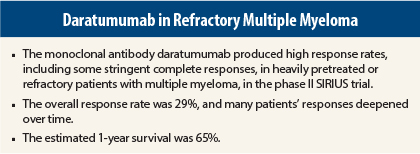Heavily pretreated patients with multiple myeloma achieved rapid, durable, and deepening responses to the anti-CD38 monoclonal antibody daratumumab, in a phase II study presented at the 2015 ASCO Annual Meeting.1
“Daratumumab showed remarkable single-agent activity in heavily pretreated and refractory multiple myeloma patients who had exhausted other therapeutic options,” reported Sagar Lonial, MD, of Winship Cancer Institute of Emory University in Atlanta. “Based on these data, daratumumab represents a new standard of care for patients in the relapsed/refractory myeloma setting.”
Daratumumab is a fully human monoclonal antibody that binds to CD38, a protein that is “highly expressed” on the surface of myeloma cells. This expression makes CD38 a “unique and potentially important target” in this disease, Dr. Lonial explained.
Response rates to single-agent daratumumab (16 mg/kg) reached 35% in the earlier GEN501 first-in-human study, and no maximum tolerated dose was demonstrated.2 “Based on this very exciting preliminary data,” Dr. Lonial noted, “the [U.S. Food and Drug Administration] FDA granted breakthrough designation for daratumumab in 2013, early on in its development.”
The current MMY2002 SIRIUS trial enrolled patients with at least three prior lines of therapy or with disease refractory to both a proteasome inhibitor and an immunomodulatory drug. To be eligible for the study, patients were required to have an absolute neutrophil count > 1 × 109/L, hemoglobin > 7.5 g/dL, platelet count ≥ 50 × 109/L, and creatinine clearance > 20 mL/min/1.73 m2. The objective response rate was the primary endpoint.
Dr. Lonial called attention to these eligibility criteria. “Remember that most early-phase clinical trials have much more stringent entry criteria. So this potentially speaks to the safety of giving immunotherapy or monoclonal antibody–based therapy in the context of relapsed disease.”
Challenging Treatment Population
Investigators evaluated two dose schedules and established the recommended dose as 16 mg/kg every week for 8 weeks, then every 2 weeks for 16 weeks, then every 4 weeks thereafter. Dr. Lonial reported the results for the 106 patients treated with this schedule. Patients had a median of five prior lines of therapy and a median time from diagnosis of about 5 years. Twenty percent had high-risk genetic profiles.
He noted that baseline characteristics are important for the interpretation of the response data. Of the 106 patients, 97% were refractory to their last line of treatment, 95% were double-refractory, and 66% were refractory to “three of the big four drugs” commonly used in myeloma: bortezomib [Velcade], lenalidomide [Revlimid], carfilzomib [Kyprolis], and pomalidomide [Pomalyst].”
Positive Outcomes
The majority of patients had reductions in paraprotein, from baseline, including 39% with reductions > 50% and 16% with reductions > 90%. The overall response rate was 29%, including 3% stringent complete responses, 9% very good partial responses, and 17% partial responses. The clinical benefit rate was 34%.
“What’s striking about this is not just that one in three patients with refractory, almost end-stage myeloma, had responses, but that we actually saw stringent complete responses and very good partial responses after a median of five prior lines of therapy,” Dr. Lonial pointed out. “It’s not only a testament to the activity of the agent but a testament to the concept that this novel mechanism of action may be important.”
He predicted, “Depth of response may actually translate into overall survival. Follow-up is short, but we had hints of that.” Over a median follow-up of 9.3 months, initial responses deepened with continued daratumumab treatment in many patients. The median time to response was 1 month, and the median duration of response was 7.4 months.
“Responses do occur quickly, and they can continue to deepen over time with additional treatment and subsequent follow-up,” Dr. Lonial said.
By subgroup, response rates were consistent across the board, whether by age (including patients ≥ 75 years), creatinine clearance, lines of prior therapy, and even presence of extramedullary disease, he emphasized.
Median progression-free survival was 3.7 months. Median overall survival was not yet reached, and estimated 1-year overall survival was 65%. Importantly, he added, 29 of 31 responders were still alive at data cutoff (January 2015).
Dr. Lonial noted that, in other datasets of double-refractory patients, median overall survival has been around 9 months. In this study, in comparison, many subjects were triple-refractory, and their estimated 1-year survival was 65%.
Good Tolerability
Grade ≥ 3 treatment-emergent adverse events were observed in 30% of patients, primarily anemia (24%), thrombocytopenia (17%), neutropenia (11%), fatigue (3%), and back pain (3%). Most of the grade 3 anemia and thrombocytopenia occurred in nonresponders, who had poor hematologic reserve at baseline. Among responders, the incidence of grade 3 neutropenia was not high at all, and no patients developed febrile neutropenia, he added.
Infusion-related reactions, unique to the delivery of monoclonal antibodies, occurred in 43% of patients and were predominantly grades 1 and 2. All but 10% were observed during the first infusion, and only 7% had subsequent infusion reactions. ■
Disclosure: Dr. Lonial is a consultant for Millennium, Celgene, Novartis, Bristol-Myers Squibb, Onyx, and Janssen.
References
1. Lonial S, Weiss BM, Usmani SZ, et al: Phase II study of daratumumab monotherapy in patients with ≥ 3 lines of prior therapy or double refractory multiple myeloma: 54767414MMY2002 (Sirius). 2015 ASCO Annual Meeting. Abstract LBA8512. Presented June 2, 2015.
2. Lokhorst HM, Laubach J, Nahi H, et al: Dose-dependent efficacy of daratumumab as monotherapy in patients with relapsed or refractory multiple myeloma. ASCO 2014 Annual Meeting. Abstract 8513.



